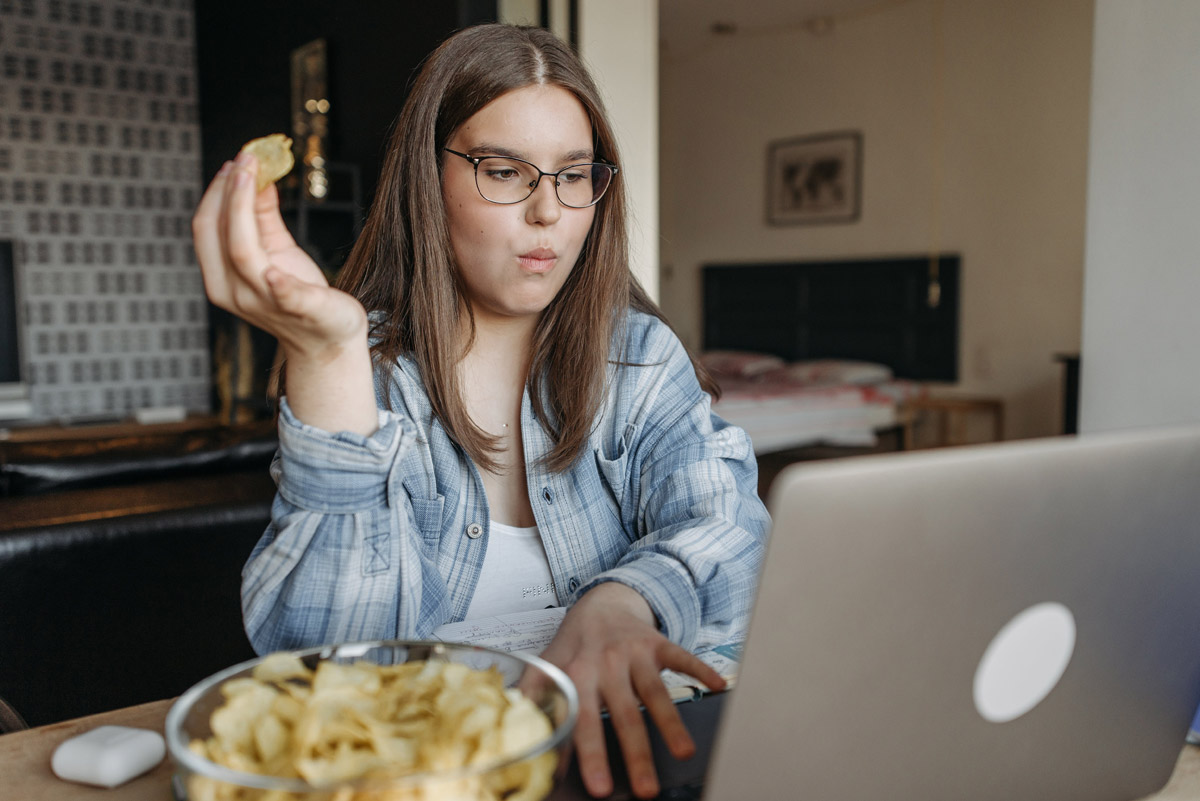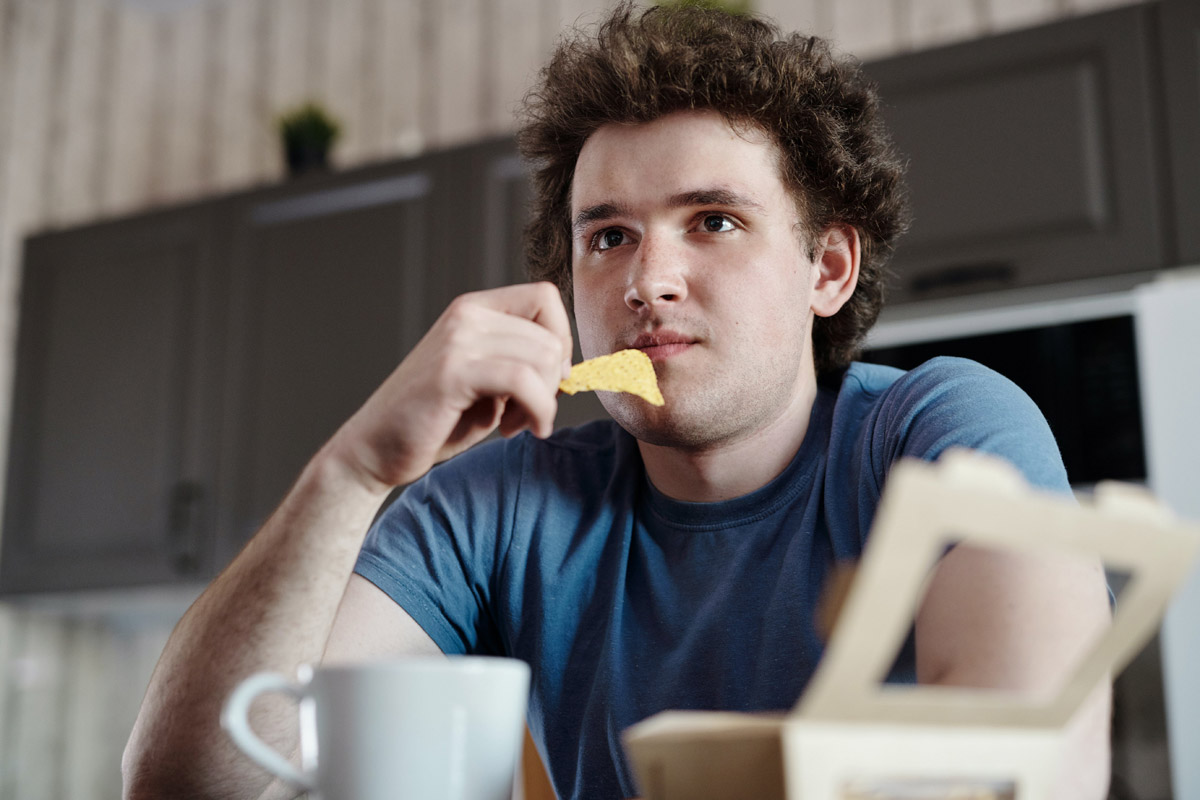
Ultra-processed food is super addictive and largely unhealthy. We all know that at this point. But the good folks at CNN thought we ought to know that its addictive quality stems in part from it being predigested. Someone’s been eating our porridge! Only instead of Goldilocks it’s the food industrial complex, and they’re breaking down staples like potatoes at the cellular level and then rebuilding the remaining slurry — that’s the manufacturing word, I’m not making this up — into the Lays chips we love. The process of destroying and remaking molecular structures, though, combined with the additives thrown in post-slurry stage, removes most of the nutritional value of the food, and disrupts the human body’s natural digestion. So why do they process food this way? Duh, because it’s cheaper! Oh, and about 73% of the US food supply is ultra-processed now. Chew on that while digesting CNN’s reporting:
The process of predigestion: To manufacture cheap, delicious food that is packaged for convenience, basic food crops such as corn, wheat and potatoes are dissembled into their molecular parts — starchy flours, protein isolates, fats and oils — or what manufacturers call ‘slurries.’ “The bulk of what is extracted is starch slurry, a milky mixture of starch and water, but we also have extracted proteins and fibers,” according to a video explanation of the process from Starch Europe, part of the European Starch Industry Association.
‘An illusion of food’: Next, with the help of artificial colorings, flavorings and glue-like emulsifiers, those slurries are then heated, pounded, shaped or extruded into any food a manufacturer can dream up. Add in just the right ratio of sugar, salt and fat designed to tickle our taste buds, and an ultra-processed food that’s nearly irresistible is born, said infectious disease specialist Dr. Chris van Tulleken, an associate professor at University College London. … “It’s an illusion of food,” he added. “But it’s really expensive and difficult for a food company to make food that is real and whole, and much cheaper for food companies to destroy real foods, turn them into molecules, and then reassemble those to make anything they want.”
Humans aren’t built like birds: Much like the regurgitated food mother birds feed their babies in the nest, ultra-processed food is quick and easy to digest, according to experts. But that’s not how the human digestive system was meant to work. Starting with teeth designed to tear food apart, the human gastrointestinal system evolved to break down whole foods into their various nutritional components, absorb those vitamins, minerals and micronutrients and then eliminate the indigestible leftovers and fiber as stool.
Skipping over stretch receptors: When food moves through the digestive system in ways Mother Nature didn’t intend, however, the body loses the ability to send a signal of fullness to the brain, said Dr. David Katz, a specialist in preventative and lifestyle medicine who founded the nonprofit True Health Initiative. “In effect you are bypassing the stretch receptor effect in the stomach,” Katz said. “Before the stretch receptors can even tell you, ‘Hey, we’ve had enough,’ you’ve put down twice as many calories as you need.”
What the frack: Breaking down the chemical and physical structure of the cells in a food, or a food’s matrix, can damage or even eliminate many of the nutrients in that food, said Anthony Fardet, a senior research scientist at the French National Institute for Agricultural Research in Paris. “By fracking food much like we frack oil, we have fully deconstructed the food matrix, and this is associated with many times higher risk of chronic disease and early mortality and a degradation of global health. … Before the Second World War, before we began using these new manufacturing processes, we never observed such a high level of chronic disease worldwide,” Fardet said.
Fighting the system: But we are paying a price, said Marion Nestle, the Paulette Goddard professor emerita of nutrition, food studies and public health at New York University, who has written books on food industry politics. “The food industry has created an eat more environment — that’s what it’s supposed to do,” Nestle said. “And it’s fun — the foods do nice things for your brain’s pleasure centers and your hormones and the like, so it’s very difficult for people to stop eating them. The other way I put it is that individuals who are trying to control their weight in today’s food environment are fighting an entire food system on their own. That’s hard to do.”
Ok, but… can I still buy the prepared meals from Trader Joe’s? I’ll confess, in my first five read-throughs of this article I was convinced that CNN was just trying to frighten us from ever eating again. And then I shifted to despondency when Professor Nestle (no relation to the food corporation, still hilarious) talked about fighting the entire system. But then I had a scathingly brilliant idea (and if you know that reference, hello you are my people). We need a reality series where contestants are given the slurry remnants of corn, wheat, and potatoes and have to turn them into real-looking food. Take the premise and earnestness of Great British Bake Off and use it to expose the industry! If Gen Z actually gets to see the slurry origins of the food they eat daily, then I have a sliver of hope they will demand change. I’ll start writing my pitch to the networks, just as soon as I finish my mint Milanos.
photos credit: Pavel Danilyuk, Esma Atak and Norma Mortenson on Pexels, Acton Crawford on Unsplash














Just saw a headline that stomach and colon cancers are on the rise in young people-I’m going to guess this is why.
Stomach cancer is usually caused by h. pylori infection. My brother in law died from gastric cancer ten years ago.
But- I agree with you re: colon cancer and ultraprocessed foods – also raised public awareness/ screening/ cologard/ pill cams/ genetic testing are probably having a hand in the increasing number of diagnoses. I hope epidemiologists are on this!
And both processed food and bacterias can be the reason, studies showed that the nature of your food select the type of bacterias in your stomach.
They even produce hormorns that influences your mood
https://www.science.org/content/article/evidence-mounts-gut-bacteria-can-influence-mood-prevent-depression
their is a lot to learn
I’ve been trying to eat better after a couple of major health scares landed me in the ICU last year but it’s so HARD. I don’t eat things like frozen dinners or chips anymore but I’m kind of lost when it comes to what to do after that. It’s like *everything* is bad for you in one way or another. Even my dietician has been like, “just do the best you can and don’t obsess over it.”
It’s easiest to think of it as just go back to basics and cooking. Get the meat, vegetables, fruit, beans, rice, potatoes and a bunch of spices and start there. Buy oatmeal for breakfast but the plain kind not the one with anything added (cooking it with milk makes it taste so much better) and put different fruit in it every day.If you don’t make it, its probably processed. It’s sad really.
Gosh, I hope you’re ok Barbara. That would have been so scary for you. I was diagnosed with IBD two years ago, high cholesterol, and am also in perimenopause. I went mostly plant-based last year as it’s beneficial for all of these conditions and have really been enjoying the health benefits and the diversity of dishes available. I thought it would be hard as Ive never been a huge vegetable eater, and I love meat. But it’s been mich better – and easier – than I anticipated. My cholesterol has come down, and I haven’t had an IBD flare in ages. I follow lots of accounts on instagram and Im never short for inspiration. I still indulge in very small amounts of junk food and eat occasionally eat meat (mostly fish and chicken), but have been really pleased with the changes Ive made.
Wishing you good health (and good food!)
There is a great resource in the form of the mediterranean dish dot com. Delicious and unfussy food is how the cook describes it. We always have a bowl of her chick pea med salad in the fridge. Made sea bass en papillote from it last night. Wander on over there sometime.
Barbara I hope you are ok, that would be so scary. I truly think all you can do is try and if that is the advice your doctor gave you then you are doing the right thing. I hope everything works out.
Michael Pollan has a food rule/tip of “Eat whatever you want, as long as you make it yourself.” I think the theory there is that you won’t eat potato chips very often if you have to actually take the time to slice and fry them, and it always struck me that he must not understand how very quick and easy it is to make cookies. However, given what is in this article, it actually probably still is a good tip, even if for different reasons. At least when I make cookies (or chips) myself, I’m using whole ingredients that my body can actually break down and go through the whole digestive process.
lol! Minnie Mouse, I was not gifted with the cookie gene. I find them quite the challenge! Consolation prize: I’m pretty good at everything else, so no one goes hungry around here. 🙃
That is actually a really tip, and would cut down on the chip consumption because that is not an easy thing to make. Cookies are super easy and for me as person who finds baking relaxing a nice stress release but I don’t want them in the house after ha.
It has a lot to do with containing MSG, which is very bad for you, being a neurotoxin. It makes the food addictive as hell.
Actually, MSG, which is a product of fermentation of corn, is not bad for you and has been used in Asian cooking for centuries. David Chang has a wonderful essay on the racist origins of the anti-MSG craze which I highly suggest you read.
Except it’s an excitotoxin, just like aspartame, and can cause ulcers, headaches, migraine headaches, etc. It is most definitely NOT good for you at all. I’m aware it’s been used for a long time in Oriental foods but I’m not sure I agree with centuries. I get a racing heart when I consume it and know immediately when something contains it. It’s far from harmless. And if the corn it’s made from is GMO, that’s even worse. So for me, hard pass.
@ Mika
I have heard the same thing. The whole “MSG is bad for you” actually does come from a racist origin.
@ kelleybelle
Your body may just not be able to process MSG. Also, not sure if you know this but the term “Oriental” is derogatory.
MSG occurs naturally in tomatoes and cheese. “Chinese restaurant syndrome” is rooted in racism. They’ve done blind tests and people don’t react to MSG until they know it’s there. https://www.cnn.com/2020/01/18/asia/chinese-restaurant-syndrome-msg-intl-hnk-scli/index.html
This just isn’t true info, and if it appears to be true, the sample size isn’t big enough OR let me guess, like most “studies” they didn’t let anyone participate who had any health issues…like autism, auto immune issues, diabetes, ect.
MSH absolutely messes me up, and it does to my kids too. We have problems with our glutamate receptors in our brains, they have PANDAS, and none of us can have MSG. When i eat it I get: migraines, swollen hands/fingers, and night terrors of all things. It took me years to figure it out. My kids get instant mood changes and they become afraid and fearful and have bad thoughts that spiral. I’ve been told we’re on the extreme end of things but there’s nothing racist about not wanting MSG in your food. Anyone with hypermobility and EDS should also stay away, since your BBB doesn’t work properly (my kids and i also have). My guess is it used to be ok then they got bombarded with so many other toxins that many people can’t handle it now. Now if our water didn’t have PFAS and micro plastics and flame retardants and other endocrine disruptors would it be ok? Who knows, but MSG can totally mess people up mentally. My night terrors with it still scare me to think about because they were so real. The bottom line is we’re all very different genetically with respect to methylation and SNP’s so don’t generalize.
Not sure this holds true in the States, but in the NLs the healthiest foods are mostly in the periphery of the supermarket.
Next. If someone over a hundred years ago would not recognize what you’re eating, make that food a treat.
There are a ton of recipes online that use basic ingredients. Find stuff you love and have time for and cook extra (takes the same amount of time to cook) so you have quick meals in the fridge/ freezer.
The store was out of the bread I normally buy, so I stood there reading ingredients lists on the different types they had and I was absolutely shocked to read that there was amylase added in several sorts!
Like, I couldn’t wrap my head around why there is an enzyme in the bread that I’ve never thought about in other connections than saliva. I got this horrific picture in my mind of people standing and spitting in the dough. Needless to say, no bread for me that day.
When I got home I googled this and they add amylase so it will break down the carbs to sugar. So it’s a way to make the bread taste sweeter without having to add sugar, or more correctly, without having to write sugar in the ingredients.
If you’re interested in knowing more about how the food industry cheats and con us to eat non-food I highly recommend the book Ultra-processed people written by Dr. Chris van Tulleken.
While I’m sure this is true, I feel like so many nutrition influencers cherry-pick things like this to demonize affordable and accessible food.
Or maybe in the big picture view, it highlights the fact that overall, the most affordable and accessible food is unhealthy— and that many corporations and our governments made deliberate decisions that allowed these divisions in who gets regular access to healthy foods to flourish.
Capitalism— with a heavy emphasis on classism and racism.
I agree, minus that part about affordable. Accessible? Absolutely. But I’m still scratching my head on how the food I cook at home is more expensive that frozen stuff, even if I’m adding the time for cooking and cleaning.
@Megan, maybe I’m saying this backwards — but, as an example, decent apples cost a LOT more per serving than corn syrup laden apple sauce. Those biscuits and cinnamon rolls in a tube cost a lot less than I would have to spend to make them from scratch.
I’ve lived in expensive areas, and I’m cooking small quantities. I also don’t have a wonderfully stocked pantry. When all of those things get added up, it really is cheaper — both in general and per serving— to buy a frozen pizza, than it is to purchase all of the ingredients, and possibly a few utensils or pans, to make one. I can buy a frozen pizza or order one ready made for far less than it would cost to buy olive oil, cheese, flour, tomatoes and herbs to make the sauce, and toppings.
True, maybe I can use the rest of the oil and the cheese for something else, but if I have to buy everything that’s needed to make a pizza, it will cost me far more than buying one. And that’s also not including labor.
“it’s really expensive and difficult for a food company to make food that is real and whole, and much cheaper for food companies to destroy real foods, turn them into molecules, and then reassemble those to make anything they want”
For the life of me I can’t understand how frying a chicken tender is more expensive than pulverizing it into molecules and then reassembling it into a chicken tender?
I also made my own sourdough bread for a couple of years, with nothing but flour, water, and salt. I didn’t often have leftovers, but when I did, I experimented with how long it took for the bread to spoil – just wrapped in plastic, not refrigerated, and it would stay perfectly edible for 7-8 days, so I don’t understand the need for a million preservatives?
And don’t get me started on salt. I recently had to dramatically cut my salt consumption, it was hard and ruined some dishes for me. But now when I go out to restaurants or buy frozen foods, everything seems eye-poppingly salty. And I know it’s not just me, we ARE consuming too much salt by every objective measure and I just don’t get why? I don’t expect everyone to go salt-free, I sure wouldn’t if I didn’t have to, but most dishes can halve the sodium and still taste just fine without posing a health risk to the consumer. Is the food industry TRYING to kill us?
Most of what I cook comes from actual ingredients – veg, beans, etc. – although I’m largely veggie and do sometimes opt for things like fake sausages. My issue is the snacks, its where I’m at my weakest! But funnily enough at the weekend I suggested to my boyfriend that we do a week with nothing processed in out diet (SOBnochocolateSOB) and he’s on board so we’ll see how that goes. The next dilemmas are when to start (pancake day next Tuesday) and whether I can count cheese as unprocessed.
I had most of my large intestine removed 3 years ago due to cancer. I like to eat healthy, but the easiest food on my digestive system is the processed stuff. I try to balance it out, but salads don’t work for me 😫
My gut can’t handle ultra processed foods anymore. They taste great and I can’t stop once I start but all it takes is the pain and discomfort in the next few hours to last a few days to put me off ultra processed foods for weeks. I’m tired after work don’t do fancy meal prep so anything I can wash and eat or saute/steam fast is what’s on the menu. Saves a lot of money as well. However going to the grocery store every other day is a chore. On the flip side it’s fast because it’s just fewer things.
A loaf of Brownberry bread got shuffled behind a box in the kitchen and forgotten for 6 weeks or so during the holidays this year. I was horrified to find it was still perfectly intact. It had zero mold, was still soft and moist, and smelled exactly like it should. Someone else was brave enough to try a sandwich and said he couldn’t tell that it wasn’t fresh.
On the one hand, that’s a mind-blowing achievement in shelf-stability. It’s amazing that it’s even possible. On the other hand, I depend on my microbes to digest my food. If the microbes outside my body can’t break it down, then can my gut fully digest it? To my mind, if it doesn’t spoil then it isn’t really food. Reading ingredients lists becomes really depressing when you’re too poor in time or money to make food from scratch.
Dear Kismet: A scathingly brilliant idea came from Haley Mills in “The Trouble With Angels”, a wonderfully fun movie from the 60’s or 70’s, that my mom, my sister and I loved. I still use that phrase as part of my vernacular, and I’ve never heard anyone else say it. So thank you. I love it. And thank you for this post, as I am struggling with my health, and as my part trying to eat in a more healthy way. For me, that has been to give up grains (wheat and corn), sugar, and the hidden and big culprit for me…..MSG. Monosodium Glutamate. Through my research, I have found that MSG is almost everywhere: in fast foods (McDonald’s french fries), in restaurants, in the grocery stores. It is a toxin to our bodies, but widely used as a flavor enhancer that makes things taste yummy. Also, it can be called yeast extract, flavoring, citric acid. There’s so many ways it can be hidden in foods under so many names. So even though I am allergic to kitchens, my kitchen and I had to come to a detente and make peace with each other.
Yes, that’s why a lot of us with GI disorders rely on them to fill the carbohydrate gap sometimes lol. A hefty number of fresh fruits and vegetables actually cause me a lot of GI pain, bloating, and cramping because they have such complex sugars to break down. Things like baked potato chips , bread, etc. are much easier on the stomach, especially when I’m ill or on my period when my GI health is already impacted. I love me some fresh fruit and veggies, but, man, do they not like me sometimes.
LOL I can’t digest most veggies like lettuce.
This is also happening in Argentina, and the economic crisis does not help one bit as eating crap is less expensive than buying meat and vegetables/fruit.
But I did notice how shit the food in the US is. I spent 10 days last month and I had cramps every single day and had to go to the bathroom multiple times a day. Even some salads aren’t even healthy. Portion sizes are really large (good for sharing, though!) and everything has additives and other additional crap food doesn’t need.
I guess cooking from scratch is the answer. You can have more control over what goes into each dish however you need a lot of time to prep and cook and not everyone has so much time to invest.